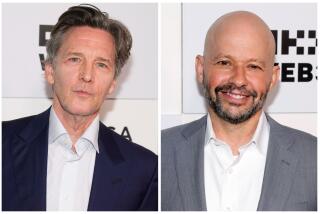The Rise and Fall of Joseph McCarthy
- Share via
When Joseph McCarthy arrived in Los Angeles in August 1953 to hold public hearings, he was at the pinnacle of his power. The previous fall, Wisconsin voters had elected him to the U.S. Senate for a second term. His wedding, just a month away, would boast a guest list of 1,000 and include such members of the Washington elite as Vice President Richard Nixon, CIA Director Allen Dulles and Sen. John F. Kennedy.
McCarthy wasn’t the only politician to come to prominence by promising to rid the country of Communist influence. After all, there was Nixon himself, plus the various chairmen of the House Committee on Un-American Activities. But in the three years since a speech in Wheeling, W. Va., in which he charged that there were 205 Communists in the State Department, McCarthy had become the center and symbol of an anti-Communist crusade that consumed the nation.
He was, it seemed, invincible. This once obscure and poorly regarded senator bullied Cabinet members and Army generals, clerks and secretaries. No matter how outrageous or flimsy, McCarthy’s accusations--he declared during the 1952 election that Democratic presidential nominee Adlai Stevenson had surrounded himself with Communist sympathizers--became front page news.
The Los Angeles hearings were typical. McCarthy focused on a bookbinder in the Government Printing Office named Edward Rothschild. McCarthy compared Rothschild to Alger Hiss and suggested that nuclear secrets were at stake. This, it turned out, was impossible, because the Atomic Energy Commission did not use the printing office. If Rothschild was a member of the Communist Party, it was never proved. At the hearings, Rothschild cited the 5th Amendment and refused to answer questions. He subsequently lost his job. And McCarthy dropped the issue of security breaches at the printing office as quickly as he had seized it.
Behind the scenes, there were signs that McCarthy was overreaching. A longtime heavy drinker, he was now an alcoholic, consuming more than a quart of liquor a day. The drinking fueled his recklessness (his staff especially worried about what he would say after lunch). Because he was no longer attacking the Truman administration’s security lapses but Eisenhower’s, he was beginning to alienate many of his own allies. This would be his undoing. An increasing number of moderate Republicans were appalled by McCarthy’s crudity; he was giving anti-Communism a bad name. He was becoming an embarrassment.
*
A year and a half after McCarthy had come to Los Angeles to grand fanfare, the Senate voted 67 to 22 to censure him on grounds that he had, among other things, brought “dishonor and disrepute” to the legislative body. He was stripped of his chairmanships. The White House froze him out, even denying him an invitation to a dinner-dance for the entire Senate. Without a platform, deserted by all but his most ardent defenders, McCarthy suffered the worst fate for a politician: He became a nonperson. His health deteriorated and, in 1957, he died a sad and broken figure.
But not before he had done terrible damage. As a result of the Red Scare, hundreds of lives suffered and reputations were destroyed. A contagion of fear and meanness swept the country. It infected almost every corner of society, from the film industry with its blacklist to universities with their loyalty oaths. The federal government alone “purged” more than 1,400 employees because they were “security risks”--a catchall for being left-wing or gay or just idiosyncratic.
By making no distinction between being a member of the Communist Party and being a Soviet agent, McCarthy distorted political discourse in this country for years to come. To be liberal was to be suspect; it meant having to forever prove you were not soft on Communism. It was no accident two Democratic presidents, John Kennedy and Lyndon Johnson, were most responsible for the United States’ involvement in Vietnam.
History, though, always carries its own ironies, and Joseph McCarthy has more than his share. We now know, 50 years later, as historians have gained access to KGB archives, that the Soviet Union had indeed infiltrated the Roosevelt administration. The evidence against Alger Hiss and Julius Rosenberg, the most contentious of the “Red Spy” cases, is now so overwhelming that few people argue anymore for their innocence. But McCarthy, for all his claims, did not identify a single Soviet spy. And “McCarthyism” has become an enduring shorthand, in Truman’s words, for “the big lie and the unfounded accusation. . . .”
More to Read
Get the L.A. Times Politics newsletter
Deeply reported insights into legislation, politics and policy from Sacramento, Washington and beyond. In your inbox twice per week.
You may occasionally receive promotional content from the Los Angeles Times.









